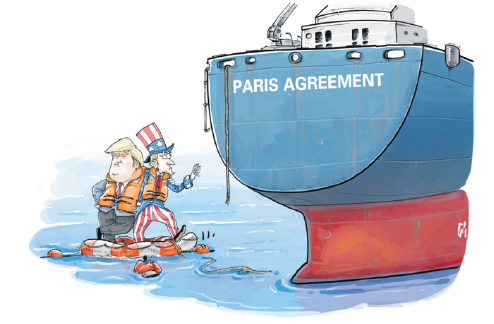 |
|
CAI MENG/CHINA DAILY |
Like many in China, I have long felt the US news media is biased in its coverage of China. Much of this, in my view, is due to an individual writer's lack of knowledge about China, his or her political bias, or the agenda of his news organization.
As a journalist, I understand the watchdog role of the press. Yet that is totally different from biased reporting.
Americans might see such a problem when they look at the news media's treatment of US President Donald Trump. It is true that Trump has made plenty of controversial or outrageous comments since he started his presidential race, but the US news media's excessive bias against Trump is obvious.
A report in May by the Harvard Kennedy School's Shorenstein Center on Media, Politics and Public Policy analyzed news coverage of Trump's first 100 days in office. It found that 80 percent of the coverage was negative, while only 20 percent was positive. This compared with the 41 percent negative coverage Barack Obama received; and the 57 percent George W. Bush received and the 60 percent for Bill Clinton.
Trump might be the first US president to face the news media head on, calling them disseminators of fake news and dishonest, something that a US president and politician would rarely do given the outsized power of news media today in influencing votes and public opinion.
However, it is clear the US news media is not almighty because Trump won the 2016 election despite a hostile media environment and a predicted landslide for Hillary Clinton, with most major polls concluding a Clinton victory was a foregone conclusion.
A report by senior media writer Jack Shafter and data reporter Tucker Doherty of Politico in May is telling. Some 72 percent of all internet publishing or newspaper employees work in a country where Clinton won. "By this measure, of course, Clinton was the national media's candidate," they wrote.
It is no secret that high ratings are also one of the drivers for the enthusiasm displayed by many US news outlets, especially the cable networks, for biased and sensational reports.
Watching and reading news about China in the US news media gives many Chinese the same feeling of bias. China rarely gets credit for anything, especially when it comes to relations with the US. The narrative is: China is always wrong. China is evil.
I cannot help laughing when watching the superficial and one-sided analysis by some talking heads on US TV networks, especially by someone who has predicted China's collapse multiple times. I wonder why some respected China experts, both in China and the US, are never or rarely invited to talk on TV. Is that because they are too rational and not sensational enough to help TV ratings?
As a Chinese national, I feel the need to go back home from time to time to catch up with the fast changes there. That is also the thinking of many China hands in the US I talked to. It is forgivable that those who have not lived in China or even visited China keep pretending they know all the problems and solutions in China.
The US news media are facing a crisis of low public confidence. A Gallup poll in June revealed that only 27 percent of respondents had a great deal or quite a lot of confidence in newspapers, 24 percent said they had high confidence in TV news; and 16 percent said they had high confidence in news on the internet.
If news media are all about public trust, then US news media have failed miserably.
The author is deputy editor of China Daily USA.